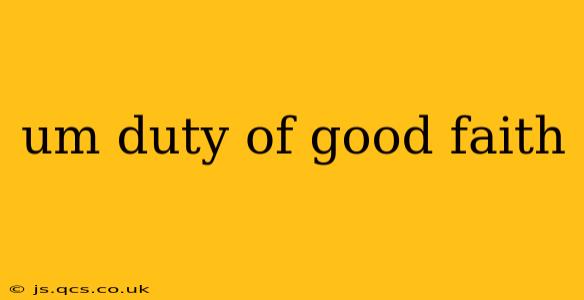The duty of good faith is a fundamental principle in many areas of law, encompassing a broad range of obligations and responsibilities. It essentially dictates that parties in a contract, or other legal relationships, must act honestly and fairly towards each other. While the exact application varies depending on the jurisdiction and specific context, the core concept remains consistent: a commitment to fair dealing and ethical conduct. This article explores the duty of good faith, its implications, and common questions surrounding its application.
What is the Duty of Good Faith?
The duty of good faith is not easily defined with a single, universally applicable definition. It's an overarching principle, implying an obligation to act honestly and fairly in the performance of a contract or within a specific legal relationship. This means avoiding actions that would unreasonably harm or disadvantage the other party. It's not just about avoiding outright dishonesty; it also involves a positive obligation to cooperate and act in a way that fosters the relationship's intended purpose.
This principle is woven into the fabric of various legal systems and is considered an implied term in many contracts, even if not explicitly stated. The specific manifestations and legal consequences of breaching this duty can differ depending on the circumstances and the relevant legal framework.
What Does "Good Faith" Mean in Contract Law?
In contract law, good faith typically means acting honestly and fairly in performing the terms of the agreement. This extends beyond simply fulfilling the literal terms; it includes acting in a way that doesn't undermine the other party's reasonable expectations of the agreement's purpose and benefits. For instance, a party cannot deliberately obstruct the other party's performance or take actions that would undermine the contract's fundamental purpose.
What are Examples of Breach of Duty of Good Faith?
Breaches of the duty of good faith can take many forms. Some common examples include:
- Deliberate obstruction of performance: Actively hindering the other party from fulfilling their contractual obligations.
- Exploiting loopholes: Taking advantage of technicalities or ambiguities in the contract to gain an unfair advantage.
- Misrepresentation or concealment of material facts: Failing to disclose information that could significantly impact the other party's decision-making.
- Unreasonable withholding of consent: In contracts requiring mutual consent for certain actions, unreasonably withholding that consent.
- Unfair conduct in negotiations: Engaging in deceptive or manipulative tactics during the negotiation phase of a contract.
How is the Duty of Good Faith Enforced?
Enforcement mechanisms vary depending on the jurisdiction and the specific breach. Remedies for a breach of the duty of good faith often include:
- Damages: Compensation for losses incurred as a result of the breach.
- Specific performance: A court order requiring the breaching party to fulfill their contractual obligations.
- Rescission: Cancellation of the contract.
- Injunctions: Court orders prohibiting the breaching party from engaging in certain conduct.
Is There a Duty of Good Faith in Every Contract?
While the duty of good faith is implied in most contracts, the extent of its application can vary. In some jurisdictions, the duty is explicitly incorporated into legislation, while in others, it is implied by common law principles. The specific obligations imposed by the duty of good faith will depend on the nature of the contract, the relationship between the parties, and the relevant legal framework. It's essential to understand that the implied duty of good faith doesn't override the express terms of the contract but rather informs their interpretation and application.
What are Some Defenses Against a Claim of Breach of Duty of Good Faith?
A party accused of breaching the duty of good faith may raise several defenses, including:
- Justification for actions: Demonstrating that their actions were reasonable and justifiable under the circumstances.
- Absence of intent to harm: Showing that they did not intentionally act to harm the other party.
- Waiver or estoppel: Arguing that the other party waived their right to enforce the duty of good faith or is estopped from doing so.
Conclusion
The duty of good faith is a cornerstone of fair dealing in various legal contexts. Understanding its implications is crucial for anyone involved in contractual relationships or other legal agreements. While its exact scope and enforcement mechanisms may vary, the underlying principle of honesty and fairness remains paramount. Consulting with a legal professional is always advisable for specific legal questions related to the duty of good faith and its application to individual circumstances.
